Part One of our series dedicated to the music of Luther Vandross can be found here.
As the Nineties dawned, Luther Vandross found himself suddenly more successful than he’d ever been. His 1989 greatest hits album, The Best of Luther Vandross…The Best of Love, had somewhat unexpectedly turned out a smash hit in “Here and Now.” By early summer, the song had become Luther’s first ever top 10 pop hit, and early the following year, it won Luther the first of his eight Grammys.
The second half of Luther’s career is much more inconsistent than the first. Luther occasionally tried to adjust his music to appeal to a crossover audience, but more often, he relied on the same old formula, which had already begun to result in diminishing returns. After a somewhat acrimonious departure from his longtime label home Epic Records, Luther regained his footing, creatively and then commercially in 2001 with his self-titled debut for J Records. Sadly, it was the last album he’d be able to fully promote. By the time Dance with My Father was released in 2003, Luther had already suffered a debilitating stroke that would leave him hospitalized or in a recovery center for the rest of his life.
Here’s a look at the albums released over the second half of Luther’s career.
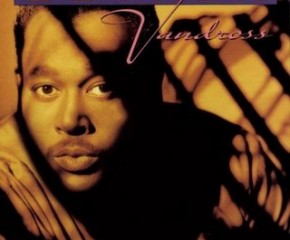 Power of Love (1991): By the time Power of Love was released in the spring of 1991, urban radio had almost completed a 180. Hip-hop, new jack swing and house were the flavors of the day, and Luther’s old-school romanticism seemed a bit dated. Power of Love does try to freshen up the sound a little bit, and the end result was one of his most commercially successful albums. The title track has a bit of a Soul II Soul bounce to it, while “Emotional Love” and “The Rush” wouldn’t sound totally out of place next to Guy or Bobby Brown. Luther knew better than to disappoint his diehards, though. “Don’t Want to Be a Fool” is, lyrically and musically, right in his pocket, and his cover of “I (Who Have Nothing)” (with duet vocals by Martha Wash) was a stylistic kin to “A House is Not a Home” and “Superstar,” even though the song wasn’t as mesmerizing as many of his older covers were. Luther tried to stay on top of newer styles without losing what made him who he was, and the execution was fairly solid. Two top 10 pop hits were generated, the album enjoyed multi-platinum sales, and Luther snagged another couple of Grammys. From an all-encompassing pop standpoint, this marked Luther’s high-water mark, even though those of us who’d been around for a bit longer knew that he was capable of better.
Power of Love (1991): By the time Power of Love was released in the spring of 1991, urban radio had almost completed a 180. Hip-hop, new jack swing and house were the flavors of the day, and Luther’s old-school romanticism seemed a bit dated. Power of Love does try to freshen up the sound a little bit, and the end result was one of his most commercially successful albums. The title track has a bit of a Soul II Soul bounce to it, while “Emotional Love” and “The Rush” wouldn’t sound totally out of place next to Guy or Bobby Brown. Luther knew better than to disappoint his diehards, though. “Don’t Want to Be a Fool” is, lyrically and musically, right in his pocket, and his cover of “I (Who Have Nothing)” (with duet vocals by Martha Wash) was a stylistic kin to “A House is Not a Home” and “Superstar,” even though the song wasn’t as mesmerizing as many of his older covers were. Luther tried to stay on top of newer styles without losing what made him who he was, and the execution was fairly solid. Two top 10 pop hits were generated, the album enjoyed multi-platinum sales, and Luther snagged another couple of Grammys. From an all-encompassing pop standpoint, this marked Luther’s high-water mark, even though those of us who’d been around for a bit longer knew that he was capable of better.
Grade: B
Never Let Me Go (1993): Two years after scoring the biggest success of his career, Luther Vandross should’ve been gearing up for a repeat engagement. Instead, he made arguably the worst album of original material he’s ever put out. Never Let Me Go isn’t awful, per se. But it is boring. None of the album’s tracks are less than 4:30 long, and it seems like a rehash of all the material he’s done before, only with none of the energy or spirit. Of course, it’s all beautifully sung, but a pretty voice is just another pretty voice unless it has meaningful material to sing. The midtempo “Heaven Knows” is a keeper, as is the finger-snapping tune “Lady, Lady,” but overall, this album is completely skippable. Even the token cover (a medley of The Bee Gees’ “How Deep is Your Love” and The Spinners’ “Love Don’t Love Nobody”) is pretty boring. Unless you are a mega-completist or find this really cheap (like, a dollar or less,) this is one Luther album you absolutely don’t need. Disappointing.
Grade: C
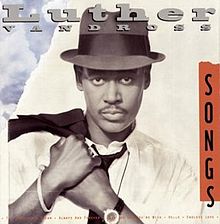 Songs (1995): As the story goes, Luther was at his wit’s end because he’d been unable to score a #1 pop single or album at that point. He’d already been involved in a lengthy lawsuit in which he tried to break ties with his longtime label home, Epic. He wound up resigning, and received special treatment from head honcho Tommy Mottola. Attempting to bring Luther the same across-the-board success afforded labelmates Michael Bolton and Mariah Carey, Mottola brought in co-producer Walter Afanasieff and they teamed up to create Songs, a collection of cover versions of hits from the Sixties and Seventies (mostly.)
Songs (1995): As the story goes, Luther was at his wit’s end because he’d been unable to score a #1 pop single or album at that point. He’d already been involved in a lengthy lawsuit in which he tried to break ties with his longtime label home, Epic. He wound up resigning, and received special treatment from head honcho Tommy Mottola. Attempting to bring Luther the same across-the-board success afforded labelmates Michael Bolton and Mariah Carey, Mottola brought in co-producer Walter Afanasieff and they teamed up to create Songs, a collection of cover versions of hits from the Sixties and Seventies (mostly.)
At the end of the day, Songs was a success: another multi-platinum album. However, it was also dead boring and almost completely devoid of soul. As with Never Let Me Go, Luther brought his professional “A” game to each of these songs; he never turned in a bad vocal performance a day in his life. But did anyone really need to hear Luther singing “Love the One You’re With”? Or “What the World Needs Now is Love”? Hell, even “Ain’t No Stoppin’ Us Now”? The answer: no. Part of the problem was Afanasieff’s antiseptic production, but a bigger part of the problem was song selection and the fact that Songs seemed scientifically calculated to go after a pop audience. In other words, it was a sellout move. And Luther’s faithful fans knew it. It probably wound up doing more damage than good. And after all of that, neither the album nor any of its singles made it to that coveted #1 spot.
Grade: C-
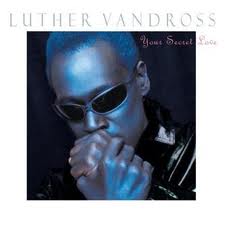 Your Secret Love (1996): Despite the multi-platinum success of Songs, Luther (intelligently) decided to “come back home” with the release of Your Secret Love a year later. It initially was greeted with surprise-not because of the music, which is pretty much in line with Luther’s signature sound, but because the cover of Your Secret Love featured Vandross looking like a blue-tinted version of Wesley Snipes’ character from “Demolition Man.” Cover aside, Your Secret Love is a fairly predictable set of midtempos and ballads. There’s nothing out of character here, but the fire that marked his original set of albums had cooled predictably and, much like Never Let Me Go, the end result comes across as Luther on AutoPilot. Middle-aged ennui? Perhaps.
Your Secret Love (1996): Despite the multi-platinum success of Songs, Luther (intelligently) decided to “come back home” with the release of Your Secret Love a year later. It initially was greeted with surprise-not because of the music, which is pretty much in line with Luther’s signature sound, but because the cover of Your Secret Love featured Vandross looking like a blue-tinted version of Wesley Snipes’ character from “Demolition Man.” Cover aside, Your Secret Love is a fairly predictable set of midtempos and ballads. There’s nothing out of character here, but the fire that marked his original set of albums had cooled predictably and, much like Never Let Me Go, the end result comes across as Luther on AutoPilot. Middle-aged ennui? Perhaps.
The two singles (Your Secret Love’s title track and the seductive “I Can Make it Better” were the best tracks (a third single, “Love Don’t Love You Anymore” is much better in remixed form.) The cover parade continues with a pretty if inessential coupling of Stevie Wonder’s “Knocks Me Off My Feet” and Little Anthony’s “Goin’ Out of My Head.” He also re-records his own composition, “It’s Hard for Me to Say,” which he cut on Diana Ross in the mid-Eighties. A curious coupling with Salt ‘n Pepa’s Spinderella comes across as a bit desperate, and when you’ve got “boring” and “desperate” being used to describe the same album, you’re probably best off skipping.
Grade: C+
I Know (1998): Following Your Secret Love, Luther parted ways with Epic and moved onto Virgin Records, which at the time was home to The Spice Girls, Lenny Kravitz and Janet Jackson. His lone album for the label, I Know, was his most inspired work in a decade, but suffered from being too long and trying to please too many audiences at once. Pop ballad? Richard Marx’s mediocre “Isn’t There Someone?” Lite-FM remake? Luther ably but boringly tackles Leo Sayer’s “When I Need You.” Some hip-hop soul? How about the nostalgic throwback “Nights in Harlem” (and its bouncier Rodney Jerkins remix, which includes the late Guru from Gang Starr.) It’s hit and miss, with somewhat more hit than miss. The juxtaposition of Luther’s voice against dusky crooner Cassandra Wilson’s on “I’m Only Human” (for smooth jazz radio) makes for a pretty song, even if it goes on for a minute or two longer than it should. The story-song “Religion” contains some of Luther’s best lyrics, and lest we forget that he began his career on the dance floor, Luther channels Sylvester with the boogie-tastic “Are You Using Me?” A tight edit would’ve made this a return to form. As is, it’s more solid than Never Let Me Go, Songs and Your Secret Love, if not Power of Love.
Grade: B-
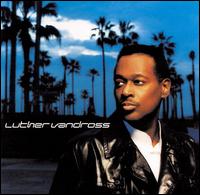 Luther Vandross (2001): The damage Luther did to his career by releasing a decade’s worth of so-so albums paid its toll, and I Know was the lowest-charting album of his career (and it’s the only one of his studio albums to not be certified Platinum.) Luther and Virgin parted ways, and after a period out of the spotlight, the vocalist became one of the first signees to Clive Davis’s J label. Luther’s self-titled 2001 album was the imprint’s second overall release (following the debut from forgettable made-for-TV boy band O-Town) and it provided a fresh 21st century update on Luther’s signature sound. Here was an album that was able to find the sweet spot joining Vandross’s old fans with a newer audience. Producers and co-writers ranging from R&B stars Joe, Jon B. and Babyface to Naughty by Nature DJ Kay Gee supplied the vocalist with tasteful, top-tier material, and the voice…well, the voice had never been a disappointment. “Can Heaven Wait” was a heartbroken ballad that had the misfortune of being released right around the World Trade Center attacks, but it contains a searing vocal performance from Luther that must be heard. “Let’s Make Tonight the Night” gives “Never Too Much” a fresh upgrade. Hearing Luther sing “I don’t want to be a hater/but he really needs to raise up off you” would be jarring in most contexts (and it’s a bit awkward here,) but kudos to the team of LV, Davis and the producers and songwriters for helping bring Luther back to critical and commercial glory.
Luther Vandross (2001): The damage Luther did to his career by releasing a decade’s worth of so-so albums paid its toll, and I Know was the lowest-charting album of his career (and it’s the only one of his studio albums to not be certified Platinum.) Luther and Virgin parted ways, and after a period out of the spotlight, the vocalist became one of the first signees to Clive Davis’s J label. Luther’s self-titled 2001 album was the imprint’s second overall release (following the debut from forgettable made-for-TV boy band O-Town) and it provided a fresh 21st century update on Luther’s signature sound. Here was an album that was able to find the sweet spot joining Vandross’s old fans with a newer audience. Producers and co-writers ranging from R&B stars Joe, Jon B. and Babyface to Naughty by Nature DJ Kay Gee supplied the vocalist with tasteful, top-tier material, and the voice…well, the voice had never been a disappointment. “Can Heaven Wait” was a heartbroken ballad that had the misfortune of being released right around the World Trade Center attacks, but it contains a searing vocal performance from Luther that must be heard. “Let’s Make Tonight the Night” gives “Never Too Much” a fresh upgrade. Hearing Luther sing “I don’t want to be a hater/but he really needs to raise up off you” would be jarring in most contexts (and it’s a bit awkward here,) but kudos to the team of LV, Davis and the producers and songwriters for helping bring Luther back to critical and commercial glory.
Grade: B
Dance with My Father (2003)
 Released shortly after suffering the stroke that would eventually cause his untimely passing, Dance with My Father finally brought Luther a #1 pop album and a Song of the Year Grammy, two things he’d wanted from the outset of his career. As his final recorded work, it’s largely a testament to his careful straddling of classic and contemporary. The title track, even without the added melancholy of Luther’s illness, was a touching, beautiful song. “Buy Me a Rose” was a masterful piece of lyricism that Luther interpreted perfectly, the uptempo “She Saw You” is playfully upbeat, and album opener “If I Didn’t Know Better” is dramatic in all the right ways. The guest rapper quotient rises here; with Foxy Brown (pretty good), Queen Latifah (super awkward) and Busta Rhymes (a really bad match) all showing up. A remake of Donny Hathaway and Roberta Flack’s “The Closer I Get to You” with Beyonce is beautifully sung, but fails to generate any real heat. Not sure whether that’s due to the 30-year age difference between the two singers or the fact that LV and Bee just didn’t have any vocal chemistry. At any rate, Dance isn’t a complete triumph, but it’s a solid work that hints at Luther being able to sustain a career in the modern era-had he lived.
Released shortly after suffering the stroke that would eventually cause his untimely passing, Dance with My Father finally brought Luther a #1 pop album and a Song of the Year Grammy, two things he’d wanted from the outset of his career. As his final recorded work, it’s largely a testament to his careful straddling of classic and contemporary. The title track, even without the added melancholy of Luther’s illness, was a touching, beautiful song. “Buy Me a Rose” was a masterful piece of lyricism that Luther interpreted perfectly, the uptempo “She Saw You” is playfully upbeat, and album opener “If I Didn’t Know Better” is dramatic in all the right ways. The guest rapper quotient rises here; with Foxy Brown (pretty good), Queen Latifah (super awkward) and Busta Rhymes (a really bad match) all showing up. A remake of Donny Hathaway and Roberta Flack’s “The Closer I Get to You” with Beyonce is beautifully sung, but fails to generate any real heat. Not sure whether that’s due to the 30-year age difference between the two singers or the fact that LV and Bee just didn’t have any vocal chemistry. At any rate, Dance isn’t a complete triumph, but it’s a solid work that hints at Luther being able to sustain a career in the modern era-had he lived.
Grade: B
Miscellany:
Before signing to Epic in 1981, Luther released two albums in a group called Luther. Those albums date from the mid-late Seventies and were out of print before Never Too Much was even released. While vinyl versions of Luther and This Close to You are certainly around, neither title has ever made it to CD (nor are they available digitally) and since Luther owned the rights to them, they probably never will.
In the latter half of the Seventies and into the Eighties, Luther sang semi-anonymous lead vocals for a number of bands including Charme, Gregg Diamond’s Bionic Boogie, Change, and Chic. Many of those songs are compiled on the box set Love, Luther (well worth your money,) even though you’d have to get Change’s The Glow of Love album to get the full album versions of the two LV-featured songs (“The Glow of Love” and “Searching.”) Both of these songs are also worth your money.
As a background singer, anonymity was kind of written into the program, but I could fill an entire CD with great songs Luther has sung background on. Chic’s “Le Freak” and “Dance Dance Dance,” Sister Sledge’s “We Are Family” and “He’s the Greatest Dancer,” David Bowie’s “Young Americans” and “Fascination,” J. Geils Band’s “Flamethrower,” Chaka Khan’s “Papillon (Hot Butterfly)”, Irene Cara’s “Fame,” Stevie Wonder’s “Part-Time Lover” and Roberta Flack & Donny Hathaway’s “Back Together Again” represent just a sampling of the sessions Luther took part on. In addition, he wrote and produced for artists including Diana Ross (“It’s Hard for Me to Say”), Aretha Franklin (the #1 R&B smashes “Jump to It” and “Get it Right”), Dionne Warwick (“How Many Times Can We Say Goodbye?”,) Whitney Houston (“Who Do You Love”) and Teddy Pendergrass (“You’re My Choice Tonight (Choose Me)”). Not a bad song in the bunch-well, except for maybe that Diana one.
Finally, there are a shit-ton of Luther compilations on the market. Two in particular stand out. One is the (previously mentioned) 4-CD set Love, Luther, which spans his entire career and pretty much covers all the hit singles, key album tracks, and adds a couple of rarities. If that’s too rich in price for you, go for The Essential Luther Vandross, a 2-disc set that doesn’t include anything from his last three studio albums, but makes a pretty convincing case as to why Luther was the definitive voice of his generation. The Ultimate Luther Vandross (yes, confusing titles) is the best of the single-disc sets. It doesn’t leave out anything major, but still feels somewhat empty without a handful of Luther’s second-tier hits. It’s good for beginners or casual fans.
Of course, a retrospective of Luther’s career wouldn’t be complete without a playlist of some of his best songs. Like with most legends, it’s hard to condense their essence into 20 songs, but if I was forced at gunpoint to name the most essential Luther songs (and keep the list to 20,) this is what I’d roll with. Enjoy.
Finally, Luther: The Life & Longing of Luther Vandross is one of my favorite musical biographies. Luther was a notoriously private individual, and this book not only discusses his musical triumphs and setbacks, but his personal struggles. His family’s struggle with diabetes is a constant refrain, as is his hush-hush sexuality. A tragic car accident right at the peak of his success was brushed under the rug in a way that would be near-impossible in the TMZ era, and of course, there’s also a bit of dirt on his feuds with Aretha Franklin, Anita Baker and En Vogue. Absolutely worth the time you take to read it.


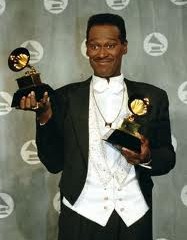
3 comments
GG says:
Aug 13, 2013
I love Take You Out, but I always thought him chasing Fancy from the Jamie Foxx Show was super awkward.
I also remember when I figured out it was him singing backup on Stevie’s Part Time Love. Mind blown.
Excellent write-up. I had a hard time connecting with a lot of Luther songs. Like you mentioned, while the voice was never in question, there was a little bit of disconnect as if he was robotic.
Because of the early classics, I wonder if stuff was just going on in his life that he was unhappy about that caused the disconnect I was hearing.
Big Money says:
Aug 13, 2013
Luther isn’t good enough for Garcelle Beauvais-Nilon? What are you saying? 🙂
Luther was very guarded about his private life, but it’s definitely obvious that he was lonely and he compensated for that by eating. He was also (allegedly) gay at a time when that was significantly less accepted. Once he got popular, I can’t imagine he saw a way out.
GG says:
Aug 13, 2013
Not that he wasn’t good enough for Fancy. But there’s an age difference, and he seemed uncomfortable in that role.
By the way, I saw Fancy in the new season of Arrested Development. Yep, still fine.